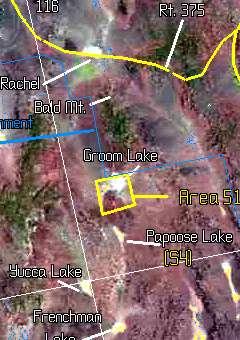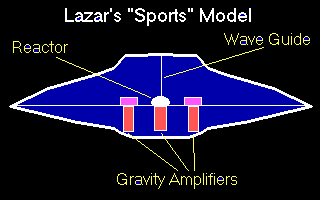What the Physicist saw:

"A
Night test at S4:" an artist's conception.
 (Copyright Lee Krystek,
1997)
(Copyright Lee Krystek,
1997)
The General frowned as he examined the accident
report. Three men dead and an underground lab destroyed. This
was a setback, but things were under control. The explosion
had been explained away and cover stories were being fabricated
to handle the disappearances of the men. The General's main
concern was to get back on schedule. For that he would need
a replacement physicist, fast...
If the claims of Robert Lazar are true, the above
represents how he came to be involved in one of the most secret,
and bizarre, operations of the United States government.
In November of 1989 Robert Scott Lazar gave a
series of interviews to George Knapp on KLAS-TV in Las Vegas.
Lazar claimed that while employed as a physicist by the U.S.
government, he had worked on a super-secret project located
in the restricted Nellis Range near Rachel, Nevada just south
of the famous "Area 51." At a hidden
base there, referred to as "S4," Lazar had been employed
to "reverse-engineer" a disc-shaped flying machine. The machine,
which Lazar refers to as the "sport" model, was one of nine
(each of a different design) parked in interconnecting hangers
at S4.
Based on the technology, the size of the seats
in the craft, and material he had read at the base, Lazar said
he believed the machines had not been built on Earth and represented
some kind of alien science. He never learned how they had been
"recovered," nor did he clearly see any extraterrestrial beings
at the base.
According to Lazar, he saw the "sport" model demonstrated
during a night test. The craft, which measured some 35 feet
in diameter, lifted and hovered while its belly glowed blue.
The machine used a propulsion system that amplified gravitational
waves. One of Lazar's chief contributions to the project was
to determine how the engine used "ununpentium," a super heavy
metal with the atomic number of 115, to generate the gravitational
waves.
During one night test, says Lazar, he took friends
out to a location that overlooked the base. Using a telescope
they were able to observe a distant glowing object flying in
a peculiar pattern.
Lazar said he got the job at S4 through Edward
Teller, famous physicist and "father of the H-bomb." Lazar left
S4 after only working there a few months when he discovered
his birth certificate had disappeared from public records. Fearing
the government was going to erase his identity and perhaps kill
him after he'd served their purpose, Lazar went public with
the series of television broadcasts.
So what do we make of his story? Does the U.S.
government really own extra-terrestrial flying saucers? Or is
Lazar being less than truthful? Or is there some other reasonable
explanation for his tale?
Even some of Lazar's critics admit that he "seems
so believable." Despite this they have gathered a sizable pile
of facts and records that undermines Lazar's story. Lazar's
supporters have built a wall of defensive counter-arguments,
and for years the veracity of his story has been debated at
the "alt.conspiracy.area51" newsgroup on the internet.
 Since
the reported location of the S4 base is in a restricted area,
it is impossible for anyone outside of the government to directly
visit the place and confirm or deny Lazar's story. Therefore
most of the debate has centered on Lazar's life and credentials
as a scientist before 1989.
Since
the reported location of the S4 base is in a restricted area,
it is impossible for anyone outside of the government to directly
visit the place and confirm or deny Lazar's story. Therefore
most of the debate has centered on Lazar's life and credentials
as a scientist before 1989.
Even one of Lazar's staunchest supporters, Gene
Huff, has admitted that the incident that first spooked Lazar,
the missing birth certificate, was a misunderstanding. Lazar
was adopted as a child, and this made his birth certificate
more difficult to obtain than normal. Eventually he did get
one.
According to Lazar he attended both MIT and Cal
Tech, receiving a Master's degree from each. At MIT he studied
physics, at Cal Tech electronic technology. Later he worked
as a physicist at Los Alamos National Laboratory (LANL).
Investigators checking at both MIT and Cal Tech
could find no record of his attendance. Lazar's supporters argue
that this is the result of the government plot to erase Lazar's
records and discredit him. Lazar failed, though, to produce
witnesses, such as professors and student advisors, that remembered
him. Researchers have checked student directories, degree lists
and alumni records and Lazar's name was not found. Some of these
records, maintained on micro film and at scattered locations,
would seem to be difficult, if not impossible, to tamper with.
No record was found of Lazar's employment at Los
Alamos National Laboratory, either, but his supporters have
produced a phone book from the lab in 1982 that lists his name.
Critics of Lazar note that the phone book covered not just LANL,
but also the Department of Energy and various private vendors.
The phone book designation indicates he worked for a vendor
at LANL, but not for the Laboratory itself. A former friend
of Lazar's, who knew him while he lived near LANL, contends
while he was there he was employed only a technician, not a
physicist, as Lazar later claimed.
In a newspaper article from that period about
a jet car Lazar owned, he is refered to as "...a physicist at
the Los Alamos Meson Physics Facility." This seems to support
Lazar contention that he was employed there, but his critics
point out the reporter undoubtedly took Lazar's own word for
his profession and employer.
George Knapp, the TV reporter who originally broke
the Lazar story, was impressed by how well Lazar knew the Los
Alamos National Laboratory. He also compared Lazar's story about
his experiences at Area 51 (the secret base where Lazar boarded
a bus to go onto the super secret S4 location) with accounts
of people known to have been employed at area 51. Lazar seemed
to know quite a bit of mundane information about the place,
including details on how you paid for your lunch at the local
commissary.
One of the strongest evidences for Lazar's story
comes from friends whom he took out near the NTS to observe
the "sport" model tests. Somehow Lazar knew something would
be visible that night. How could he if he didn't work there?
Also, there's the question of a polygraph test
(lie detector) Lazar took to prove his claims. Unfortunately,
administering and interpreting a polygraph test is as much an
art as a science and the results can be inconclusive and occasionally
wrong. Lazar did well on the test, but the administrator couldn't
say for sure that Lazar was being completely truthful.
 What
about the science Lazar describes behind the alien flying saucer
technology? Does it check out? Most professional physicists
dismiss his description of how an alien anti-gravity drive might
work. Lazar supporters state that scientists do not understand
gravity as well they think they do, and as they learn more they
will see that Lazar's alien technology really does work.
What
about the science Lazar describes behind the alien flying saucer
technology? Does it check out? Most professional physicists
dismiss his description of how an alien anti-gravity drive might
work. Lazar supporters state that scientists do not understand
gravity as well they think they do, and as they learn more they
will see that Lazar's alien technology really does work.
The above is just a fraction of the arguments
raised to support or detract from Lazar's story. How do we know
which side is right?
Lazar's story is almost impossible to prove, or
disprove. Why? Because part of the story predicts that efforts
will be made to tamper or destroy evidence that might support
Lazar's case. Therefore it isn't surprising that no evidence
is found. Also any evidence that is found that denies the story's
legitimacy can be said to be planted.
In this situation it may be necessary to employ
one of the late Carl Sagan's favorite rules: "Extraordinary
claims require extraordinary proof." Lazar's claims are indeed
extraordinary, but his story, though well told and surprisingly
consistent, has little proof associated with it. Until more
proof is offered, and perhaps this means another S4 scientist
going public, neither the scientific community or the general
public is likely to give his tale much credence.
For those who want more information about the Robert
Lazar story, check the sites below. You can also purchase a model
of Lazar's "sport" disc from the Testor Corporation.

Copyright Lee
Krystek 1997. All Rights Reserved.





 Since
the reported location of the S4 base is in a restricted area,
it is impossible for anyone outside of the government to directly
visit the place and confirm or deny Lazar's story. Therefore
most of the debate has centered on Lazar's life and credentials
as a scientist before 1989.
Since
the reported location of the S4 base is in a restricted area,
it is impossible for anyone outside of the government to directly
visit the place and confirm or deny Lazar's story. Therefore
most of the debate has centered on Lazar's life and credentials
as a scientist before 1989.
 What
about the science Lazar describes behind the alien flying saucer
technology? Does it check out? Most professional physicists
dismiss his description of how an alien anti-gravity drive might
work. Lazar supporters state that scientists do not understand
gravity as well they think they do, and as they learn more they
will see that Lazar's alien technology really does work.
What
about the science Lazar describes behind the alien flying saucer
technology? Does it check out? Most professional physicists
dismiss his description of how an alien anti-gravity drive might
work. Lazar supporters state that scientists do not understand
gravity as well they think they do, and as they learn more they
will see that Lazar's alien technology really does work.
